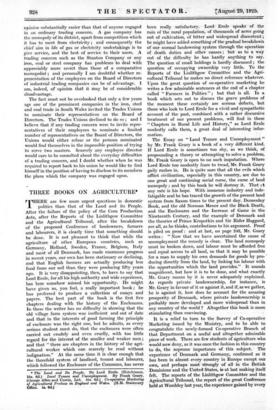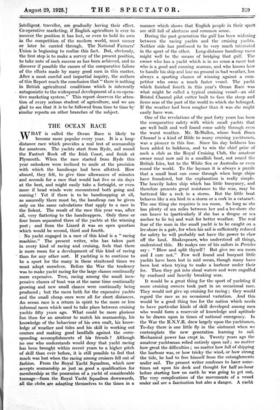THREE BOOKS ON AGRICULTURE•
THERE are few more urgent questions in domestic politics than that of the Land and its People. After the failure of the policy of the Corn Production Acts, after the Reports of the Linlithgow Committee and the Agricultural Tribunal, after the breakdown of the proposed Conference of landowners, farmers and labourers, it is clearly time that something should be done. It is not pleasant to think that while the agriculture of other European countries, such as Germany, Holland, Sweden, France, Belgium, Italy and most of all Denmark, has made enormous progress in recent years, our own has been stationary or declining, and that English farmers are actually producing less food from our soil than they were producing fifty years ago. It is very disappointing, then, to have to say that Lord Ernie, for all his high authority and wide experience, has here somehow missed his opportunity. He might have given us, you feel, a really important book ; he has preferred to produce a collection of essays and papers. The best part of the book is the first five chapters dealing with the history of the Enclosures. In these the writer has no difficulty in showing that the old village farm system was inefficient and out of date and that in the interests of good farming the principle of enclosure was the right one, but he admits, as every serious student must do, that the enclosures were often carried out crudely and even cruelly, with too little regard for the interest of the smaller and weaker men ; and that " there are chapters in the history of the agri- cultural worker which can scarcely be read without indignation." At the same time it is clear enough that the threefold system of landlord, tenant and labourer, which followed the Enclosure of the Commons, has never
. _
* The' Land and Its People. By Lord Ernie. (Hutchinson. 10e. 6d.) Land Tenure and Unemployment. By Frank Geary. (George Allen and Unwin, Ltd. 10s. 6d.) Co-operative Marketing of. Agricultural Produce in England and Wales. (H.M. Stationery Is. 6d.) been really satisfactory.- Lord Ernie speaks of the ruin of the rural population, of thousands of acres going out of cultivation, of bitter and widespread discontent ; he might have added something of the gradual breakdown of our normal landowning system through the operation' of death duties and other causes ; but as to a way out of the difficulty he has hardly anything to say. The question of small holdings is hardly discussed ; the question of occupying ownership very little. To the Reports of the Linlithgow Committee and the Agri- cultural Tribunal he makes no direct reference whatever. Upon the great question of co-operative marketing he writes a few admirable sentences at the end of a chapter called " Farmers in Politics " ; but that is all. In a book which sets out to discuss the grave problems of the moment these certainly are serious defects, but those who look to Lord Ernie for a vivid and sympathetic account of the past, combined with a rather discursive treatment of our present problems, will find in these " Chapters in Rural Life and History," as Lord Ernie modestly calls them, a great deal of interesting infor- mation.
The Essay on " Land Tenure and Unemployment " by Mr. Frank Geary is a book of a very different kind. If Lord Ernie is sometimes too shy, as we think, of propounding a theory or attempting to solve a problem, Mr. Frank Geary is open to no such imputation. Where Lord Ernie too modestly fears to tread, Mr. Frank Geary gaily rushes in. He is quite sure that all the evils which afflict civilization, especially in this country, are due to one great and continuing social curse, the curse of land monopoly ; and by this book he will destroy it. That ut any rate is his hope. With immense industry and inde- fatigable zeal he has traced the growth of the present land system from Saxon times to the present day. Domesday Book, and the old Norman Manor and the Black Death, and the Enclosures and the Increase of Game in the Nineteenth Century, and the example of Demnark and the theories of Prince Kropotkin and Sir Rider Haggard, are all, as he thinks, contributions to his argument. Proof is piled on proof : and at last, on page 242, Mr. Geary writes : " Now that we have ascertained the cause of unemployment the remedy is clear. The land monopoly must be broken down, and labour must be afforded free and equal access to all land, so that it may be possible for a man to supply his own demands for goods by pro- clueing directly from the land, by linking his labour with the opportunities - which the land provides." It sounds magnificent, but how it is to be done, and what exactly Mr. Geary means by it is never adequately explained. As regards private landownership, for instance, is Mr. Geary in favour of it or against it, and if, as we gather, he is against it, how does he account for the amazing prosperity of Denmark, where private landownership is probably more developed and more widespread than in any country of the world ? Altogether this book is more stimulating than convincing.
It is a relief to turn to the Survey of Co-operative Marketing issued by the Ministry, and to be able to congratulate the newly-formed Co-operative Branch of that Department on a useful and altogether admirable piece of work. There are few students of agriculture who would now deny, as it was once the fashion in this country to do, the supreme importance of this subject. The experience of Denmark and Germany, confirmed as it has been in almost every country in Europe except our own, and perhaps most strongly of all in the British Dominions and the United States, is at last making itself felt. The reports of the Linlithgow Committee and the Agricultural Tribunal, the report of the great Conference held at Wembley last year, the experience gained by every intelligent. traveller, are gradually having their effect. Co-operative marketing, if English agriculture is ever to recover the position it has lost, or even to hold its own in the competition of the modem world, must sooner or later be carried through. The National Farmers' Union is beginning to realize this fact. But, obviously, the first step is to make a survey of the present position, to take note of such success as has been achieved, and to discover if possible the causes of the comparative failure of the efforts made by many good men in this matter. After a most careful and impartial inquiry, the authors of this Report reach the conclusion that " there is nothing in British agricultural conditions which is inherently antagonistic to the widespread development of a co-opera- tive marketing system." This report deserves the atten- tion of every serious student of agriculture, and we are glad to see that it is to be followed from time to time bar similar reports on other branches of the subject.



































 Previous page
Previous page